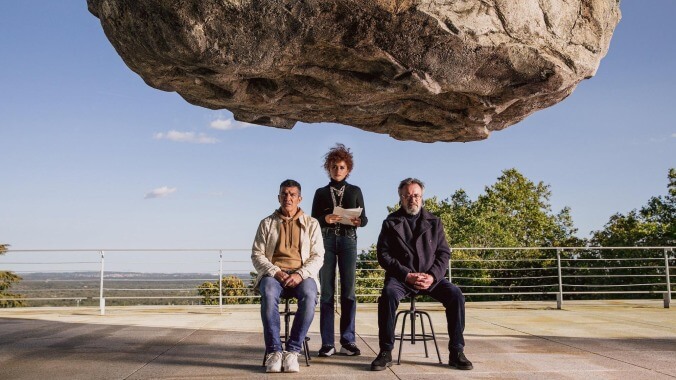In the droll comedy Official Competition, filmmakers fight to see who's most insufferable
Antonio Banderas and Penélope Cruz have a blast spoofing the film biz in this satirical swipe at the acting process

Whenever a director makes a film about the movie industry, you wonder if they signed on because they wanted to stick a shiv into an often cruel and frustrating business (see: Vincente Minnelli’s The Bad and the Beautiful) or if they wanted to craft a heartfelt love letter to the medium that inspired them (see: Tim Burton’s Ed Wood). Official Competition, the droll new comedy from Argentinian writer-directors Gastón Duprat and Mariano Cohn, does both of these things while also functioning as a proxy war between commercial and non-commercial art.
Antonio Banderas and Oscar Martínez play the combatants, actors from opposite ends of the artistic spectrum who collide during rehearsals for a new film directed by an arthouse auteur given eccentric, flame-haired life by Penélope Cruz. Official Competition is not an anything-goes bombardment of film-biz joke grenades, like Ben Stiller’s hilarious, Tropic Thunder. As in Duprat and Cohn’s previous effort, 2016’s The Distinguished Citizen, the satire here is not delivered with a sledgehammer so much as a pin that draws blood but rarely hurts. Consistently amusing, if about a reel too long, it’s a tightly controlled, low-boil send-up of the acting process.
The film opens as pharmaceutical mogul Humberto Suárez (José Luis Gómez) ponders his legacy after his 80th birthday celebration and decides that financing a movie would be his best shot at immortality. He pays a fortune for the rights to a Nobel Prize-winning book he never read about two estranged brothers, and he hires oddball, Palme d’Or-winning filmmaker Lola Cuévas (Cruz) to direct the screen adaptation. With her Sideshow Bob hairdo and worrisome promise to create a “very loose version of the novel,” Lola gets to work, casting libidinous movie idol Félix (Banderas), and self-serious thespian Iván (Martínez), in the roles of the warring siblings.
From the jump, when Félix pulls up to the first script reading in a Lambo versus Iván’s modest arrival in a taxi, we get the drift that their nine-day rehearsal period in Humberto’s cavernous office complex will be an ideological face off. The perennially underappreciated Banderas, who has long mixed Hollywood films with smaller productions in his native Spain, comes ready to play, gleefully, if delicately, spoofing the pretentions of movie stardom. A spoiled, gluten-free sellout whose immense fame functions in inverse proportion to how seriously he seems to take his craft, Félix sums up his acting philosophy with the statement, “I’ll study the words and say them with conviction and authority.” This puts him in direct conflict with Iván, a revered acting teacher who thinks film is “an industry for numbskulls.” He can barely hide his disdain for what Félix represents and the terrific Martínez maintains an exterior of grizzled equanimity against Banderas’ A-list swagger.
Their battle of wits is one that Lola tacitly encourages in the belief it’ll lead to a more combustible dynamic that will benefit the film. As the rehearsal period continues, her methods become increasingly farcical. First, she forces Félix and Iván to run lines while sitting underneath a five-ton boulder suspended by a crane. Later she tries to break down their egos by entombing them in cling wrap and making them watch helplessly as she tosses their awards into a metal shredder. All this may sound like we’re knee deep in absurdist waters, but Duprat and Cohn (who co-wrote the script along with Duprat’s brother, Andrés) maintain a flat, observational tone. They’re ably assisted by cinematographer Arnau Valls Colomer, whose locked-down camera never leans into the laughs, no matter how difficult it becomes for Félix and Iván to stay cordial.
If you think Duprat and Cohn are destined to come down on the side of a serious artist like Iván, one of the pleasures of Official Competition is how it skewers the insufferable humility of Iván as much as it does the celebrity egotism of Félix. Claiming the industry is filled with “airheads, whores, and the corrupt,” Iván rejects the idea of acting competitions, then is caught practicing an acceptance speech holding a coffee pot. Even more obnoxious, in his fantasy speech, he refuses the award. As for Félix, he’s the proud recipient of 13 international awards yet he still goes to cruel lengths to prove to Iván that he takes the job seriously and is not a lousy actor.
The more these two bicker the more we realize that Lola’s bizarre techniques may actually be working, assuming Félix and Iván don’t kill each other before the cameras start rolling. Cruz, helped immeasurably by the outré costumes of designer Wanda Morales, thoroughly embraces Lola in a performance that could have been a one-note portrayal of artistic folly. Instead, Cruz allows Lola’s effective methods to shine through her madness and the Oscar-winning Spanish native has us wondering which of her many directors she’s playfully channeling.
Official Competition’s dissection of “the process” is not only bone-dry and very funny, it’s also sneakily authentic. One can learn a lot about how actors prepare, find their emotions and connect (or don’t connect) with their on-screen partners from watching the film. The latter point is crystalized in hilarious fashion when Félix and Iván rehearse a scene that requires them to each vigorously make out with Humberto’s daughter, Diana (Irene Escolar). Before they begin, Félix whispers to Diana with easygoing professionalism, “Sorry if I have an erection. Sorry if I don’t.” When it’s Iván’s turn, he dolefully drops his head and tells her, “Forgive me.” As directors who’ve worked with performers big and small, Duprat and Cohn know there’s a folding chair at the table read for a flamboyant movie star who makes it look easy and a brilliant artiste who needs to suffer for his art. Both are talented in their own way. And both are always a little bit nuts.